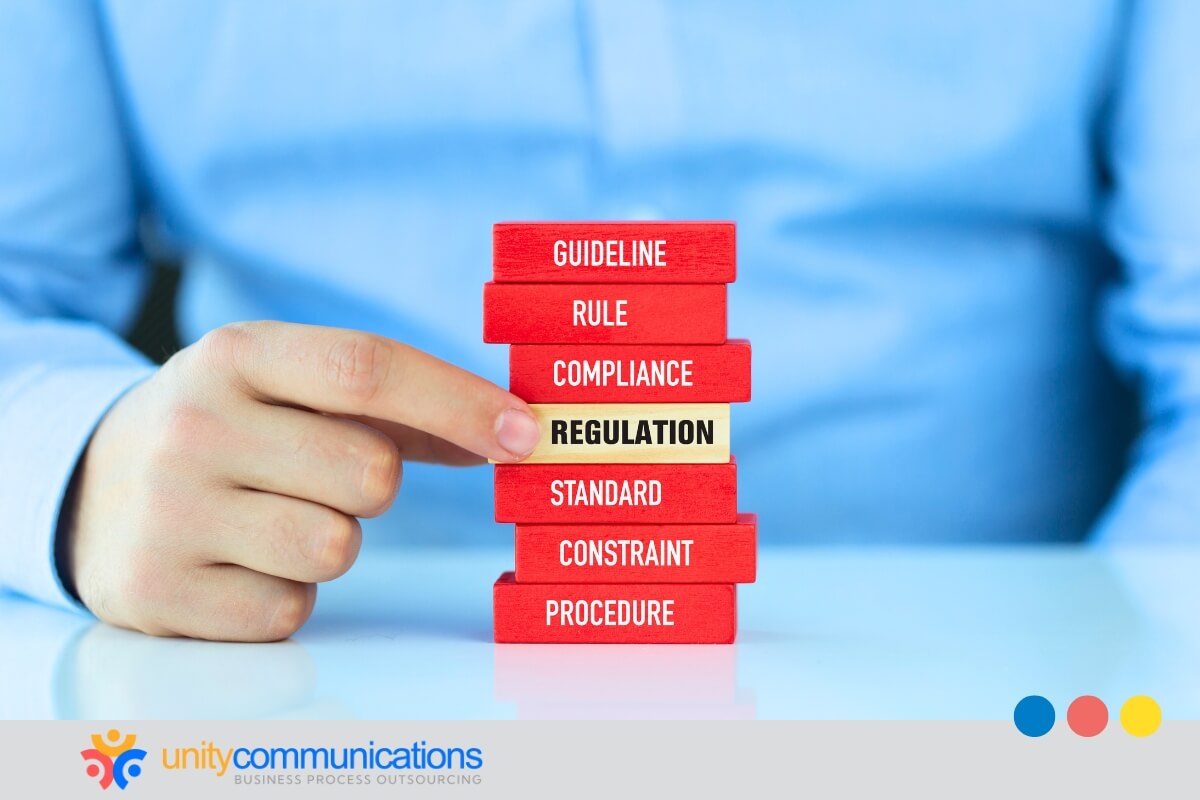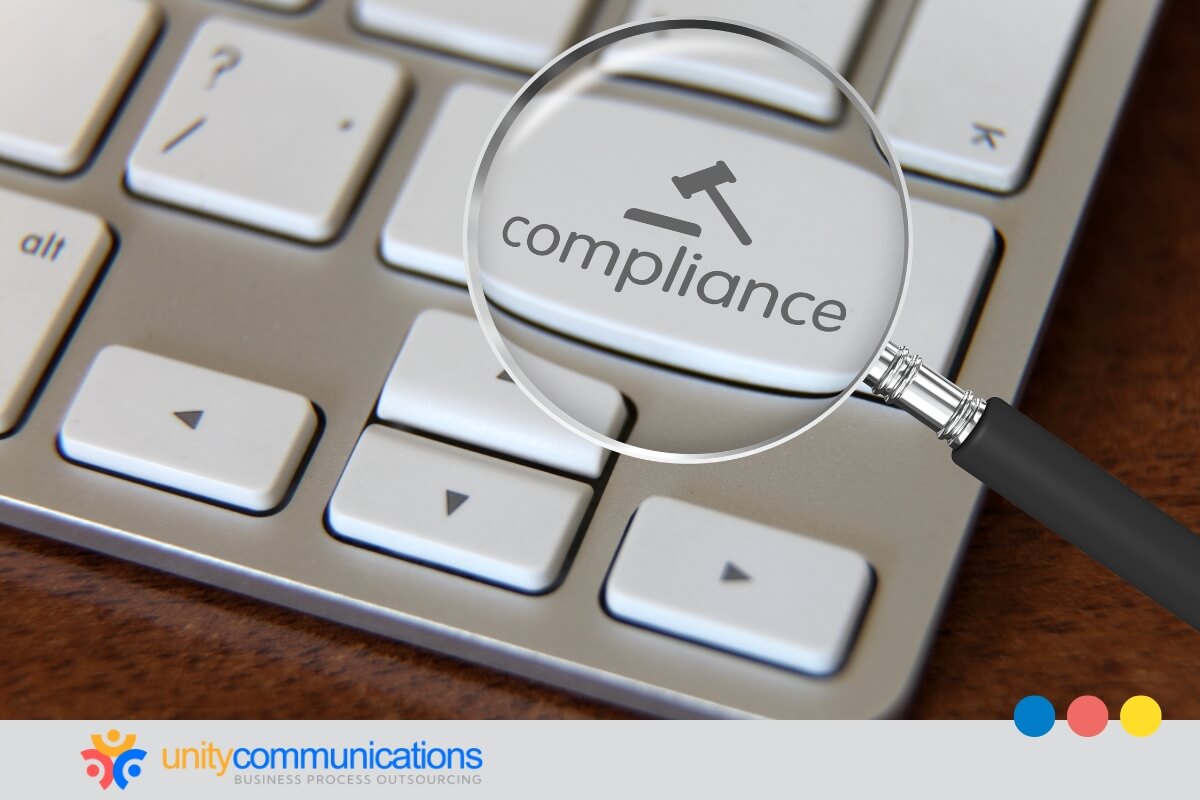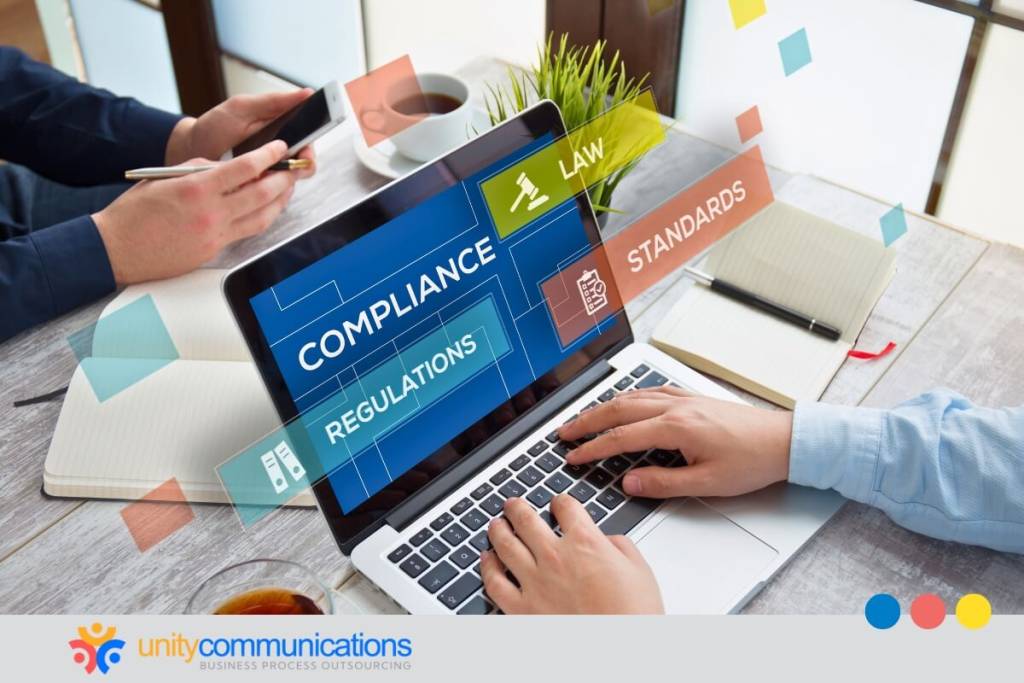Table of Contents
Navigating the complex business process outsourcing (BPO) landscape requires entrepreneurs in the Windy City to adopt a meticulous approach. A practical outsourcing compliance checklist becomes critical for Chicago business owners to ensure ethical practices, safeguard sensitive data, and adhere to local, state, and international regulations.
This article discusses why data security and compliance are vital when partnering with a Chicago BPO company. It also lists the essential government, industry, and data regulations that Chicago entrepreneurs must comply with.
Stay on this page for a complete outsourcing compliance checklist covering the factors Chicago business owners must consider to secure their operations.
How BPO, Data Security, and Compliance Intersect

First of all, what is BPO? This practice entails assigning specific company procedures or activities to service providers. Organizations outsource various functions, including information technology (IT), customer support, and back-office tasks, to increase efficiency while focusing on core capabilities.
However, this partnership brings new concerns, with data security and regulatory compliance emerging as primary issues. Outsourcing requires sharing information with third-party vendors, necessitating strict adherence to government policies and industry standards
Why Data Security and Compliance Are Crucial in Outsourcing
Chicago business owners must learn the importance of data security and regulatory compliance when considering or engaging in outsourcing. Here are a few reasons to be on guard:
- A business’s reputation is essential. A data breach can damage a company’s reputation. Chicago businesses must prioritize data security to maintain client, customer, and partner trust.
- Legal compliance is non-negotiable. Businesses in Chicago must comply with evolving data protection laws by understanding and adhering to various regulations.
- Financial consequences are real. Fines for violating data protection laws can be hefty. Chicago businesses engaging in outsourcing must factor in potential financial penalties that can harm the bottom line.
- Customer trust is fragile. Building trust with consumers involves demonstrating a commitment to data security. Thoroughly vetting outsourcing partners is crucial to ensuring equal responsibility for safeguarding sensitive information.
- Cybersecurity threats are pervasive. Chicago faces cyber threats like ransomware, and businesses planning to outsource should prioritize cybersecurity to counter those risks effectively.
- Data breaches are costly. Data breaches go beyond fines; recovery costs involve investigations, remediation, and potential lawsuits. For instance, a data breach in 2023 hit the Republic Bank of Chicago and affected over 7,000 individuals, exposing the bank to indirect costs and financial risk.
- Industry standards matter. Chicago businesses must ensure outsourcing partners meet or exceed industry-specific data security requirements for secure collaboration.
- Data is a strategic asset. Chicago entrepreneurs must value and secure data as a strategic asset through comprehensive security measures, safeguarding it from becoming a liability.
- Employee training is vital. Chicago businesses must keep their workforce informed about cybersecurity threats and best practices to minimize the risk of human error. By prioritizing employee training, they can combat data breaches.
- A robust security culture is necessary. When outsourcing, select partners that align with internal values and prioritize security. Embedding data security in the organizational culture enhances defense against potential threats.
Data Compliance in Outsourcing: Key Regulations

The following section further explores data compliance and the international, national, and Chicago-specific laws shaping secure outsourcing practices.
International and National Compliance Laws
These global and regional regulations cover outsourcing practices:
- The General Data Protection Regulation (GDPR) is a European Union (EU) law that empowers individuals and regulates data processing with strict standards. It is crucial for ensuring data privacy compliance among Chicago businesses with EU clients.
- The Health Insurance Portability and Accountability Act of 1996 (HIPAA) sets the standards for safeguarding healthcare information. Chicago businesses must adhere to HIPAA to protect patient data, ensuring compliance and trust.
- The Federal Risk and Authorization Management Program (FedRAMP) ensures Chicago companies outsourcing federal data adhere to standards, guaranteeing rigorous security for cloud services and safeguarding sensitive data used by federal agencies.
- Compliance with Service Organization Control 2 (SOC 2) is crucial for Chicago businesses and third-party vendors handling sensitive information. It imposes strict security, availability, processing integrity, confidentiality, and privacy principles while outsourcing.
- Adherence to the National Institute of Standards and Technology Special Publication 800-171 (NIST SP 800-171) is essential for companies engaging in government-related outsourcing. It outlines cybersecurity requirements for protecting Controlled Unclassified Information (CUI).
- The International Traffic in Arms Regulations (ITAR) demands that Chicago companies engaged in defense-related industries understand its requirements. Compliance during outsourcing is crucial to prevent unauthorized access to sensitive information linked to defense and military technologies.
- The Payment Card Industry Data Security Standard (PCI DSS) dictates that if outsourcing involves payment processing, Chicago companies must prioritize partners’ compliance. This ensures secure credit card data handling and reduces financial fraud risks.
- The International Organization for Standardization/International Electrotechnical Commission (ISO/IEC) 27001, as a standard for information security management, is beneficial when outsourcing. It provides a globally recognized framework for aligning data security practices with international standards.
Chicago Compliance Laws
Chicago’s regulatory landscape is rife with compliance laws affecting outsourcing practices. Among them:
- The Illinois Personal Information Protection Act (PIPA) mandates that Chicago businesses protect personal information. Outsourcing partners must align with this law to secure sensitive data.
- The Biometric Information Privacy Act (BIPA) is essential for Chicago businesses. Aligning with BIPA mandates ensures personal information protection when working with outsourcing partners.
- The Illinois Consumer Fraud and Deceptive Business Practices Act mandates transparency and fairness, ensuring Chicago companies’ compliance with ethical practices and data security prevention.
- The Illinois Data Security on State Computers Act covers Chicago businesses that are outsourcing government projects. It outlines security measures for data protection and ensures compliance with state-specific regulations.
- The Illinois Freedom of Information Act (FOIA) is crucial for businesses outsourcing public-sector services in Chicago. It governs access to public records and ensures transparency with disclosure requirements.
- The Illinois Health Information Exchange and Technology Act covers healthcare outsourcing providers in Chicago. It requires compliance with health information exchange regulations, sets technology standards, and emphasizes the security of sensitive medical data.
- The Illinois Securities Law of 1953 requires Chicago businesses outsourcing financial services to follow regulations, promote fair and ethical practices, protect financial data, and prevent fraud.
- The Chicago Data Breach Notification Law mandates businesses to adhere to local regulations, ensuring timely and transparent reporting of security incidents and mitigating potential data breach impacts.
- The City of Chicago Information Security Policy outlines city-specific security standards for technology. Chicago businesses outsourcing city-related projects must align to ensure a secure partnership.
Outsourcing Compliance Checklist for Chicago Businesses

At this point, you might wonder, why consider outsourcing call center, customer support, and other services to a BPO company? The primary reasons are enhanced productivity, skilled expertise, lower costs, and greater flexibility.
BPO firms offer niche services, including cybersecurity, quality assurance and testing, research and analytics, and contact center as a service (CCaaS) solutions. Reliable outsourcing providers also assure customer trust and loyalty, regulatory compliance, and resilience against cyberattacks, all of which help Chicago businesses grow in the long run.
Below is our essential outsourcing compliance checklist, tailored to help Chicago businesses align with local laws and international standards to guarantee secure and compliant subcontracting practices.
Data Security Policy
The first factor to discuss in our outsourcing compliance checklist is a robust data security policy. Chicago business owners must develop a solid plan to protect sensitive information and comply with security regulations and standards.
The benefits of building a detailed data security policy include:
- Regulatory compliance assurance. A firm data security policy ensures Chicago businesses comply with regulations, minimizing the risk of legal consequences.
- Better protection of sensitive information. A well-defined policy safeguards sensitive data, preventing breaches and potential damage to the company’s reputation.
Here are some tips to build a robust data security policy:
- Conduct a comprehensive risk assessment. Identify risks in data processes. Assessing possible vulnerabilities during outsourcing helps enhance data management security and compliance.
- Define precise data classification. Categorize data by sensitivity. Clearly define confidential, sensitive, and public information to tailor security measures appropriately.
- Establish access controls and permissions. Enforce strict access controls, limit data access, and regularly update permissions based on roles.
Vendor Assessment and Selection
The next part of the outsourcing compliance checklist involves evaluating and choosing BPO partners based on their alignment with the Chicago business’s security, compliance, and ethical standards.
Among the advantages of vendor assessment and selection are:
- Aligned security. Vendor assessments ensure Chicago companies evaluate potential partners’ security measures, aligning them with internal standards and protecting sensitive data.
- Ethical business practices. Evaluating vendors includes ensuring ethical practices, promoting integrity, and preventing reputational damage for Chicago clients.
Consider these pointers for conducting vendor assessment and selection:
- Define outsourcing objectives. Outline outsourcing goals to evaluate vendors based on their ability to meet specific business needs.
- Establish evaluation criteria. Develop vendor parameters for assessment, considering security, compliance, financial stability, past performance, and scalability.
- Evaluate security measures. Review vendor security, covering data protection, encryption, access controls, and industry compliance. Prioritize partners with solid security practices.
Contractual Considerations
An outsourcing compliance checklist would not be complete without a detailed examination and discussion of terms, expectations, and legal requirements between the Chicago business and the third-party partner.
The perks of well-defined contractual considerations include:
- Legal compliance. Carefully designed contracts guarantee that local, state, and international regulations are adhered to, reducing legal risks and safeguarding Chicago companies from potential penalties.
- Clear expectations. Thorough contracts outline each party’s expectations, duties, and obligations, reducing misunderstandings while building and strengthening a transparent outsourcing partnership.
Follow these tips when considering contractual aspects:
- Establish data security standards. Include terms addressing data security and privacy compliance, ensuring the outsourcing partner follows the relevant standards and legislation to secure sensitive information.
- Ensure confidentiality and non-disclosure. Execute strict confidentiality and non-disclosure policies to protect confidential information and maintain data security and anonymity while outsourcing data.
- Identify legal and regulatory framework. Understand the legal and regulatory landscape to ensure the contract conforms with Chicago, state, and international outsourcing regulations.
Worker Training and Awareness
Ensuring third-party staff know about security measures, protocols, and compliance standards is another essential aspect of outsourcing compliance checklists for Chicago business owners.
Worker training and awareness benefits include:
- Greater adherence. Informed workers enhance regulatory adherence by aligning outsourcing engagements with local, state, and international laws.
- More robust data protection. Training empowers staff to implement effective measures to safeguard sensitive information and reduce the likelihood of unauthorized access or data leaks.
Follow these recommendations when assessing third-party staff training and awareness:
- Determine requirements. Conduct a thorough needs assessment to identify specific security and compliance areas requiring specialized training and ensure the provider has the staff to meet these needs.
- Customize training plans. Determine whether the provider employs tailored training plans aligned with identified needs. This step guarantees relevant, engaging content that meets the unique requirements of outsourcing engagements.
- Launch interactive workshops. See if the provider conducts engaging workshops with active participation, discussions, and practical exercises to enhance staff understanding of security protocols and compliance expectations.
Monitoring and Auditing
Outsourcing compliance checklists cover the duration of the engagement as well. Chicago businesses must check procedures to confirm compliance with established standards and regulations.
Two positive aspects of monitoring and auditing include:
- Enhanced data security. Monitoring and auditing help reinforce data security measures to handle sensitive information according to established security protocols and compliance requirements.
- Greater vendor accountability. Holding outsourcing partners accountable through regular audits fosters a sense of responsibility, encouraging vendors to adhere to contractual agreements and security expectations.
Consider these valuable tips for monitoring and auditing:
- Conduct surprise audits. Include unscheduled audits for authentic compliance assessments and evaluating day-to-day operations without prior notice.
- Utilize automation tools. Leverage automation tools to streamline monitoring processes, enabling real-time tracking, data collection, and analysis for efficient and accurate compliance evaluations.
- Stay informed about regulatory changes. Keep updated on local, state, and global regulations, adapting monitoring practices for ongoing compliance with changing legal standards.
Data Security Technologies
The next step in the outsourcing compliance checklist involves advanced technology. Chicago business owners must ensure their partners have the tools and solutions to safeguard digital information from unauthorized access, breaches, and threats.
Some benefits of leveraging third-party data security technologies include:
- More significant encryption for confidentiality. Applying encryption technologies to sensitive data in transit and storage ensures privacy and thwarts unauthorized access in case of security breaches.
- Extra multi-factor authentication (MFA). MFA bolsters authentication with multiple verification steps (passwords, biometrics, or tokens), adding additional protection against unauthorized access.
Here is how to leverage data security technologies:
- Tailored security solutions. Select data security technologies suited to the outsourcing engagement’s unique needs, ensuring a customized approach to data security.
- Collaborate with security experts. Engage with third-party cybersecurity experts for insights on the latest data security advancements, best practices, and emerging threats.
- Develop incident response planning. Establish an integrated incident response plan with the BPO partner for an efficient and coordinated response during security incidents.
Emergency Response Plan
When outsourcing, Chicago business owners must also establish an emergency response plan outlining actions to take during unforeseen events or crises.
Below are the positive outcomes of an emergency response plan:
- Minimized downtime. A well-defined plan enables Chicago businesses to reduce downtime during emergencies, fostering quick decision-making and efficient resource allocation for faster recovery.
- Better compliance with regulations. An emergency plan ensures regulatory compliance, preventing legal consequences for Chicago businesses by demonstrating preparedness for unanticipated events.
An emergency response plan can be established in the following ways:
- Conduct risk assessments. Identify potential risks and vulnerabilities specific to outsourcing operations, considering geographical locations, natural disasters, and cyber threats.
- Document and review procedures. Record detailed emergency procedures and regularly update them to align with changes in outsourcing or emerging threats.
- Generate redundancies. Introduce redundancies in critical systems and operations to mitigate the impact of potential failures during emergencies.
Periodic Review and Revision
To cap off the outsourcing compliance checklist, Chicago businesses must regularly examine and update plans for continued relevance and effectiveness.
The benefits of performing periodic reviews and revisions include:
- Regulatory adjustments. Regular reviews mean ongoing and prompt incorporation of changes in local, state, and international regulations.
- Continuous improvement. Constant review and revision cultivate a culture of improvement.
Check these helpful pointers when performing period review and revision:
- Designate responsibility. Assign specific individuals or teams committed to reviewing and revising for accountability and thoroughness.
- Stay current on regulatory changes. Stay vigilant about local, state, and international regulations that might impact outsourcing compliance, and quickly integrate these changes into the operation.
- Establish a regular schedule. Set a recurring schedule for periodic review and revision, ensuring consistency and timely updates.
The Bottom Line

Establishing and maintaining a robust outsourcing compliance checklist is indispensable for Chicago business owners. Adhering to relevant regulations ensures data security and ethical business practices.
A proactive approach to compliance safeguards sensitive information, minimizes legal risks, and fosters a culture of continuous improvement in the dynamic outsourcing landscape.
Let’s connect to learn more about building an outsourcing compliance checklist for Chicago business owners!



